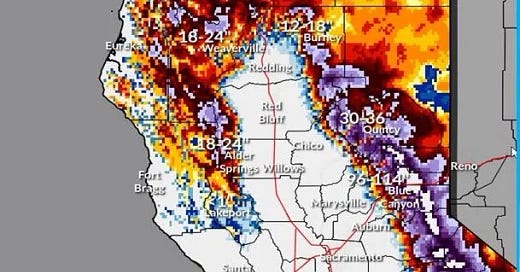Iceland's Coldest Winter Since 1995-96; Largest-Ever Temp Swing In Iron Mountain; No Hurricane Trend In 167-Years; California Forecast 14+ Feet In 48 Hours; + Record-Challenging Cold On Antarctica
The COLD TIMES are returning...
Iceland's Coldest Winter Since 1995-96
Iceland's long climb out of the last Little Ice Age appears to have peaked (2010-ish). Temperatures are now tanking.
Hungurdiskar has plotted Iceland's average winter temperatures dating back to 1823 (with reliable data to 1874). What the chart shows is a stark drop-off in recent years, since around 2017. For a comparable plunge you need to go back to the early-1960s.
Here's a closer look:
The cold is identifiable in the record books, too.
The summer of 2022 was very cold. The seasonal high at Reykjavík, for example, was pegged at just 17.9C (64.2F), which made for the capital’s lowest maximum summer temperature since 2001. Across the country, there were 27 summer days where the temperature exceeded 20C (68F), far fewer than the 57 logged the previous year. Heavy unseasonal snow was also a theme.
That December went on to deliver Iceland it's coldest final month for 50 years.
The national average for Dec 2022 came out at -4C (24.8F) — Iceland’s coldest December since 1973 (solar minimum of cycle 20). Reykjavík posted an average of -3.9C (25F) which is a whopping 4.7C below the multidecadal norm and meant the capital city endured its coldest December in 126 years, matching the Dec of 1916 (The Centennial Minimum), according to Met Office data. On only three prior occasions has Reykjavík been colder: in 1878, 1886 and 1880.
The first nine months of 2023 continued the trend.
The nation’s capital posted an average of 5.9C (42.6F) for Jan - Sept 2023, well-below the multidecadal average. Along the way, the country endured its coldest March since 1979 (-3.8C below average).
The fall of 2023 didn't let up, and then Dec 2023 went and delivered anomalies of -4C below the multidecadal norm.
For the three most recent winter months (Dec-Jan-Feb of 2023-24)—and ignoring that Iceland also includes March as a winter month as it's coldest temperatures are often endured then—the national average winter temperature has finished -1.7C below the norm, which makes for an even colder winter than last year, and the coldest, in fact, since 1994-95 (solar minimum of cycle 22).
The data has also been plotted for the capital Reykjavík, as shown below, and it tells the same story — a temperature cliff dive:
Largest Temperature Swing In Iron Mountain History
Keep reading with a 7-day free trial
Subscribe to Electroverse Substack to keep reading this post and get 7 days of free access to the full post archives.






